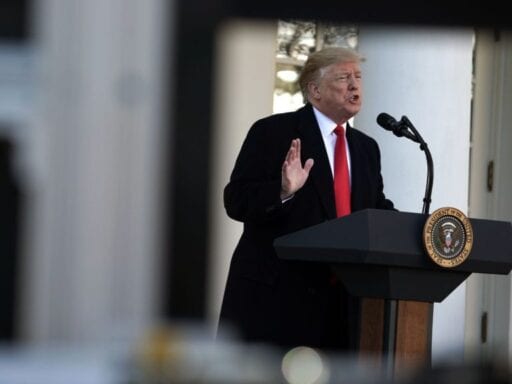Floundering government services, sagging approval ratings, and a failed Senate vote all became too much for even Trump to take.
On its 35th day, the partial government shutdown finally reached its breaking point.
For weeks, hundreds of thousands of government workers missed paychecks, Smithsonian museums closed their doors, and certain government services slowed to a crawl. Yet it wasn’t until Thursday that Congress or the White House seemed to have any sense of urgency about the partial shutdown, which began on December 22.
As the impasse dragged into its second month, President Donald Trump announced Friday that he would sign a short-term spending bill reopening the government for three weeks, without allocating money for his border wall.
Through it all, Trump seemed as dug in as ever, even tweeting just the day before: “We will not Cave!” And yet, by any real measure, he caved.
What changed?
The effect on government services has become untenable
While the Trump administration has done its best to try to curb the painful effects of the shutdown, doing everything from recalling furloughed IRS workers for tax season to identifying extra funding for food stamps, there was only so much it could do to keep vital services afloat while the government was closed.
This Friday, a snafu with air traffic control attracted widespread coverage and even safety concerns. As Vox’s Dara Lind reports, because there were so many air traffic controllers calling in sick at key airports along the Eastern seaboard, many planes weren’t able to land safely at places like New York’s LaGuardia Airport.
Countless other government services have also been stalled including IPO reviews, immigration cases, and low-risk food inspections. The pile-up of problems caused by the shutdown has been growing with each passing day, so much so that it’s quickly become completely unmanageable.
Friday’s air traffic control problems were apparently a key tipping point.
“A White House official [said] airport delays played an important role in President Trump’s decision to back down on his insistence for border wall funding — even if it’s just temporary,” CNN reports. There has been increasing speculation that a major government service would need to flounder for lawmakers to feel an urgency on the shutdown.
The air traffic control issues certainly appear to have made that impression.
Federal workers missed a second paycheck
Friday was also notable because it marked the second paycheck that hundreds of thousands of federal workers would be missing as the shutdown dragged into its second month. Workers — especially government contractors — have been among those hardest hit by the shutdown, which has left many wondering how they would pay their mortgage bills, purchase medication and buy food for their children.
As Vox’s Alexia Fernández Campbell reports, unemployment applications from federal workers reached an all-time high this month, with a striking 35,000 federal workers filing for benefits. Story after story has emerged highlighting the awful position this shutdown has put workers and contractors in, as many looked to bolster their income with jobs driving for Uber or freelancing.
Senators across the country including those in Trump-dominated states have been hearing from constituents who have been negatively affected by the shutdown, including federal workers forced to go to food banks to tide themselves over during the stalemate.
While Trump did not appear particularly affected by worker outcry, congressional lawmakers, including some Republicans, signaled repeatedly that they certainly were.
Polls were increasingly souring on the president
As government services and federal workers continued to suffer, polls also soured on the president at a rapid clip.
While shutdowns have not been found to have significant electoral impacts in the past, as Vox’s Dylan Scott has reported, this shutdown isn’t exactly like others that have happened in recent years. For one, it’s officially the longest in American history and on top of that, Trump has clearly put himself at the center of it.
As a result, Trump’s approval rating has been steadily tanking, even among certain members of his base. A recent Politico/Morning Consult poll found that Trump’s disapproval rating was at an all-time high of 57 percent.
Though Republican support for the wall remained strong, public opinion overwhelmingly blamed the president for the shutdown, something he couldn’t really escape after he said he would be “proud” to “own the shutdown,” during a December meeting with Senate Minority Leader Chuck Schumer and House Speaker Nancy Pelosi.
With the 2020 presidential race on the horizon, Trump likely wants to minimize any potential criticism he could face on this front, even as he’s bragged about unsubstantiated bipartisan support for his border wall.
A failed vote on Trump’s proposal put pressure on the White House
All of these forces, coupled with a pair of failed Senate votes, came to a head at the end of this week.
During a Thursday vote, the Senate rejected a proposal from Trump, which included a $5.7 billion demand for the border wall. The failure of that vote revealed that Trump’s approach, as is, didn’t stand a chance of getting through either the Republican-controlled Senate or the Democrat-controlled House.
Ultimately, only one Democrat opted to back Trump’s proposal in the Senate, while multiple Republicans crossed over to support a Democratic option.
This outcome left the White House scrambling to identify other ways out, Politico reports. Senate Republicans, meanwhile, were growing increasingly restless about the shutdown as well, pushing Majority Leader Mitch McConnell to fix the situation during a tense conference lunch on Thursday, according to the Washington Post.
With lawmakers in Congress and the White House both eager to find a fix, Trump ultimately agreed to hold off on declaring a national emergency and try a short-term resolution first.
It’s a decision that came as pressure mounted from all sides including the public as well as his own party.
Author: Li Zhou
Read More



